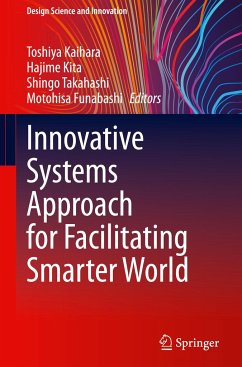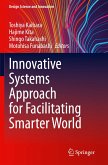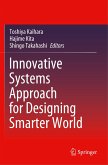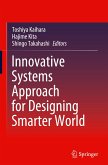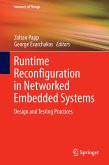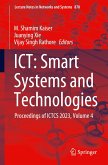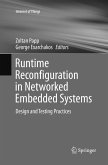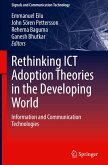Innovative Systems Approach for Facilitating Smarter World
Herausgegeben:Kaihara, Toshiya; Kita, Hajime; Takahashi, Shingo; Funabashi, Motohisa
Innovative Systems Approach for Facilitating Smarter World
Herausgegeben:Kaihara, Toshiya; Kita, Hajime; Takahashi, Shingo; Funabashi, Motohisa
- Gebundenes Buch
- Merkliste
- Auf die Merkliste
- Bewerten Bewerten
- Teilen
- Produkt teilen
- Produkterinnerung
- Produkterinnerung
This book introduces state-of-the-art concepts and methodologies on innovative systems approach that enables the grand design and implementation about Smarter World. This book also describes the shared view that the various heterogeneous social systems that make up Smarter World should be viewed as systems at an abstract level, and develop new developments in SoS and spiral systems through the cycle of analysis, synthesis and abduction. Several new concepts that integrate data-driven mechanism into traditional model-driven methodologies in systems approach are explained with practical…mehr
Andere Kunden interessierten sich auch für
![Innovative Systems Approach for Facilitating Smarter World Innovative Systems Approach for Facilitating Smarter World]() Innovative Systems Approach for Facilitating Smarter World116,99 €
Innovative Systems Approach for Facilitating Smarter World116,99 €![Innovative Systems Approach for Designing Smarter World Innovative Systems Approach for Designing Smarter World]() Innovative Systems Approach for Designing Smarter World116,99 €
Innovative Systems Approach for Designing Smarter World116,99 €![Innovative Systems Approach for Designing Smarter World Innovative Systems Approach for Designing Smarter World]() Innovative Systems Approach for Designing Smarter World116,99 €
Innovative Systems Approach for Designing Smarter World116,99 €![Runtime Reconfiguration in Networked Embedded Systems Runtime Reconfiguration in Networked Embedded Systems]() Runtime Reconfiguration in Networked Embedded Systems77,99 €
Runtime Reconfiguration in Networked Embedded Systems77,99 €![ICT: Smart Systems and Technologies ICT: Smart Systems and Technologies]() ICT: Smart Systems and Technologies186,99 €
ICT: Smart Systems and Technologies186,99 €![Runtime Reconfiguration in Networked Embedded Systems Runtime Reconfiguration in Networked Embedded Systems]() Runtime Reconfiguration in Networked Embedded Systems85,99 €
Runtime Reconfiguration in Networked Embedded Systems85,99 €![Rethinking ICT Adoption Theories in the Developing World Rethinking ICT Adoption Theories in the Developing World]() Rethinking ICT Adoption Theories in the Developing World116,99 €
Rethinking ICT Adoption Theories in the Developing World116,99 €-
-
-
This book introduces state-of-the-art concepts and methodologies on innovative systems approach that enables the grand design and implementation about Smarter World. This book also describes the shared view that the various heterogeneous social systems that make up Smarter World should be viewed as systems at an abstract level, and develop new developments in SoS and spiral systems through the cycle of analysis, synthesis and abduction. Several new concepts that integrate data-driven mechanism into traditional model-driven methodologies in systems approach are explained with practical applications. As such, it offers a valuable resource for systems engineers, system integrators, and researchers in related engineering fields, as well as government policymakers.
Produktdetails
- Produktdetails
- Design Science and Innovation
- Verlag: Springer / Springer Nature Singapore / Springer, Berlin
- Artikelnr. des Verlages: 978-981-19-7775-6
- 2023
- Seitenzahl: 232
- Erscheinungstermin: 2. März 2023
- Englisch
- Abmessung: 241mm x 160mm x 18mm
- Gewicht: 560g
- ISBN-13: 9789811977756
- ISBN-10: 9811977755
- Artikelnr.: 65956872
- Herstellerkennzeichnung Die Herstellerinformationen sind derzeit nicht verfügbar.
- Design Science and Innovation
- Verlag: Springer / Springer Nature Singapore / Springer, Berlin
- Artikelnr. des Verlages: 978-981-19-7775-6
- 2023
- Seitenzahl: 232
- Erscheinungstermin: 2. März 2023
- Englisch
- Abmessung: 241mm x 160mm x 18mm
- Gewicht: 560g
- ISBN-13: 9789811977756
- ISBN-10: 9811977755
- Artikelnr.: 65956872
- Herstellerkennzeichnung Die Herstellerinformationen sind derzeit nicht verfügbar.
Toshiya KAIHARA is a Professor of Graduate School of System Informatics, and Director of Value Creation Smart Production Research Centre at Kobe University, Kobe, Japan. He received the B.E. and M.E. degrees from Kyoto University, Kyoto, Japan, and the Ph.D. and DIC from Imperial College London, London, UK. His research interests include systems optimization and simulation, and their application into production, service, and social systems. He is author of more than 450 publications. He is an editor and author of book: Innovative Systems Approach for Designing Smarter World (2020) of Springer. He is a member of JSME(Fellow), IEEJ(Fellow), EAJ, ISCIE, SICE, JSPE, ORSJ, SSJ, CIRP(Fellow), IFAC, IFIP, IEEE, and others. Hajime KITA is a Professor at Institute for Liberal Arts and Sciences, Kyoto University in Japan. He received his PhD degree from Kyoto University. His research interests are evolutionary computation, social simulation and education of informatics in university. He is author and editor of books: Agent-Based Simulation: From Modelling Methodologies to Real-World Applications (2005), Control of Traffic Systems in Buildings (2006), Agent-Based Approaches in Economic and Social Complex Systems V (2009), Realistic Simulation of Financial Markets (2016) of Springer. Shingo TAKAHASHI is Professor of the Department of Industrial and Management Systems Engineering and Director of Institute for Social Simulation at Waseda University. He holds MS and PhD in Systems Science from Tokyo Institute of Technology. His current research interests include: modeling and simulation of social systems as complex adaptive systems, especially focusing on agent-based social simulation and soft systems thinking as practice, aimed at applying to soft, i.e. ill-structured, problem situations involving various people with plural world views. Dr. Motohisa FUNABASHI is a System Scientist. He graduated from Graduate School of Engineering, Kyoto University in 1969, and joined Hitachi, Ltd. working for R&D on systems control (1969-2010). Also he served as a Visiting Professor, Graduate School of Mathematical Sciences, the University of Tokyo (1996-1999), a Visiting Professor, Graduate School of Informatics, Kyoto University (2003-2008), an Auditor of the National Institute for Environmental Studies (2007-2011), a Senior Professor of Japan Advanced Institute of Science and Technology (2012-2017), and a Program Officer of Low Carbon Technology Development and Demonstration Program of the Ministry of the Environment (2018-2020). His current research interests include computational systems modeling and architecting. He is a member of SICE (Honorary Member and Fellow), IEEJ (Fellow), IEEE, and ACM, and others.
Chapter 1. Toward realization of innovative systems approach for societal design - Multiscale Social Modeling and Simulation (MSMS) methodology.- Chapter 2. Modelling-Driven Optimization Problems with Uncertainty Tolerance and Their Solution Strategies: A Risk-Management Perspective in the Circulating and Spiral-up Systems Approach.- Chapter 3. Issues of System Cooperation from a Viewpointof System Structure.- Chapter 4. Boundary and Relationality Perspective Systems Approach -Towards Its Development.- Chapter 5. Relationality Design Emphasizing Clinical Aspects of System of Systems in Local Community.- Chapter 6. Black-Box Optimization and Its Applications.- Chapter 7. Estimation of objective functions: Modelling of problems and understanding of decision-making processes towards the spiral-up systems approach.- Chapter 8. Co-evolutionary decision-making modeling via integration of machine learning and optimization.- Chapter 9. Agent Modeling, Gaming Simulation, and Their Formal Description.- Chapter 10. Causal and deductive reasoning in socio-economic systems.- Chapter 11. Co-Creative Modeling as Adaptive Decision-Making Process.- Chapter 12. Mutual Growth of Human and System in Smarter World.- Chapter 13. Towards SoS Evolution Management for Developing Smarter Cities-Social Significance and Approaches.- Chapter 14. Power System Progressing with Systems Approach.- Chapter 15. Power Network System Technology A Focus on SoS.- Chapter 16. Systems of Systems in Railway.- Chapter 17. Current and Future Trends on Smart Home Technology -Including SoS Perspective.
Chapter 1. Toward realization of innovative systems approach for societal design - Multiscale Social Modeling and Simulation (MSMS) methodology.- Chapter 2. Modelling-Driven Optimization Problems with Uncertainty Tolerance and Their Solution Strategies: A Risk-Management Perspective in the Circulating and Spiral-up Systems Approach.- Chapter 3. Issues of System Cooperation from a Viewpointof System Structure.- Chapter 4. Boundary and Relationality Perspective Systems Approach -Towards Its Development.- Chapter 5. Relationality Design Emphasizing Clinical Aspects of System of Systems in Local Community.- Chapter 6. Black-Box Optimization and Its Applications.- Chapter 7. Estimation of objective functions: Modelling of problems and understanding of decision-making processes towards the spiral-up systems approach.- Chapter 8. Co-evolutionary decision-making modeling via integration of machine learning and optimization.- Chapter 9. Agent Modeling, Gaming Simulation, and Their Formal Description.- Chapter 10. Causal and deductive reasoning in socio-economic systems.- Chapter 11. Co-Creative Modeling as Adaptive Decision-Making Process.- Chapter 12. Mutual Growth of Human and System in Smarter World.- Chapter 13. Towards SoS Evolution Management for Developing Smarter Cities-Social Significance and Approaches.- Chapter 14. Power System Progressing with Systems Approach.- Chapter 15. Power Network System Technology A Focus on SoS.- Chapter 16. Systems of Systems in Railway.- Chapter 17. Current and Future Trends on Smart Home Technology -Including SoS Perspective.

